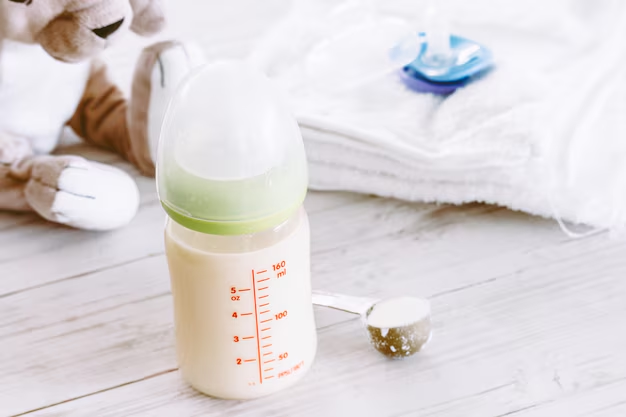How Long Does Baby Formula Last in the Refrigerator? A Comprehensive Guide for Parents
Navigating the world of infant nutrition can be daunting, especially when concerning the shelf life and storage of baby formula. This guide seeks to demystify how long baby formula can stay in the refrigerator and offer practical insights on maintaining its quality and safety. Whether you're a new parent or looking to refresh your knowledge, understanding these fundamentals ensures your baby receives nourishment that is both safe and high-quality.
🌟 The Basics of Baby Formula Storage
Understanding Baby Formula: Types and Composition
Baby formula is designed to closely mimic the nutritional profile of breast milk, providing essential nutrients your infant needs to grow and thrive. There are primarily three types:
- Powdered Formula: The most economical and longest-lasting form. It requires careful preparation to avoid contamination.
- Liquid Concentrate: Needs mixing with water and is more expensive but slightly more convenient than powdered form.
- Ready-to-Feed Formula: The most convenient and priciest option, requiring no preparation other than opening the package.
Storage 101: Optimal Conditions
To keep formula fresh and safe, following recommended storage practices is vital. Powdered formula remains stable and safe when kept cool, dry, and tightly sealed until its expiration date. Liquid formulas, whether ready-to-feed or concentrated, should always be stored in the refrigerator once opened.
Infants' Safety: Why Storage Guidelines Matter
Incorrect storage can lead to the growth of bacteria, posing health risks for infants. Ensuring formula is stored properly is crucial to prevent issues like foodborne illnesses, which infants are particularly susceptible to.
🕒 Formula Storage Duration: The Key Timelines
How Long is Formula Safe in the Refrigerator?
Prepared liquid formulas should generally be used within 24 hours once mixed and refrigerated. This time frame ensures maximum freshness and minimizes bacterial growth. If formula remains in the bottle after feeding, it is best to discard it to prevent contamination.
Powdered Formula: Shelf Life and Expiry
While unopened powdered formula can last until its expiration date, it should ideally be used within a month of opening. It's crucial to store it away from heat and moisture to preserve its integrity.
Ready-to-Feed: A Convenient Option with Longevity
Once opened, ready-to-feed formulas need refrigeration and should be used within 48 hours. It's an appealing option for parents who need a no-fuss, reliable solution, albeit at a higher cost.
📋 Practical Storage Tips for Parents
Fridge Organization: Keeping Formula Safe
- Temperature Matters: Keep your fridge at 39°F (4°C) or below. A refrigerator thermometer is an inexpensive tool that ensures proper temperature.
- Location is Key: Store formula at the back, where the temperature is most consistent, away from the door to avoid temperature fluctuations.
Preparation Guidelines: Maintain Hygiene and Quality
- Cleanliness: Always wash hands thoroughly before preparing formula.
- Sterilization: Regularly sterilize all feeding equipment, including bottles and nipples, to avoid bacterial contamination.
- Follow Instructions: Adhere to water-to-formula ratios specified by the manufacturer to ensure proper nutritional balance.
Traveling with Formula: On-the-Go Storage Solutions
- Insulated Bags: When traveling, use an insulated cooler bag with ice packs to maintain formula temperature.
- Avoid Prolonged Exposure: Try to minimize the time formula spends at room temperature to prevent bacterial growth.
👶 Addressing Common Concerns and Questions
Can I Reheat Formula?
While reheating is discouraged to avoid overgrowth of bacteria, if necessary, always use a bowl of warm water rather than a microwave to ensure even heating. Check the temperature before feeding it to your baby.
What If My Baby Doesn’t Finish the Bottle?
Formula left for more than an hour at room temperature should be discarded. Bacteria from the baby's saliva may contaminate the formula, increasing contamination risks.
Recognizing Spoilage: Signs to Watch For
Look for visual cues like separation or clumping. Unusual odors or changes in color can also be indicators of spoilage. When in doubt, it's safer to discard and prepare fresh formula.
📝 Handy Quick-Reference Guide: Formula Storage Highlights
Here's a visual guide to quickly capture the essentials:
| Storage Method | Shelf Life | Notes |
|---|---|---|
| Prepared Formula | 24 hours in fridge | Store immediately after preparation. |
| Ready-to-Feed Formula | 48 hours in fridge after opening | No preparation needed; just pour. |
| Powdered Formula | 1 month after opening and until expiration date when unopened | Store in a cool, dry place. |
Key Takeaways for Busy Parents:
- 🧊 Always refrigerate formula after it's prepared or opened.
- ⏰ Use prepared formula within 24 hours and ready-to-feed within 48 to ensure freshness.
- 🍼 Discard unfinished bottle contents and avoid reheating to prevent bacterial growth.
- 🚫 Pay attention to expiration dates and signs of spoilage to ensure safety.
👀 The Role of Innovation: Future Trends in Formula Storage
Emerging trends in technology may soon introduce smart storage solutions designed to monitor formula freshness actively. Innovations like connected fridge cameras or apps could provide real-time updates and reminders to ensure your baby's formula is always fresh and safe.
In conclusion, being well-informed about formula storage practices not only ensures your baby's safety but can also simplify your daily routine as a parent. By following these guidelines, parents can confidently store and use baby formula, providing peace of mind about their baby's nutrition and health.

